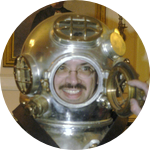About This Project
Millions of tons of plastics enter our ocean each year, eventually breaking down into microplastics (MPs) that propagate throughout ecosystems. MP presence needs to be further characterized to assess the health risks posed by plastic pollution. My research proposes a low-cost detection system that uses the fluorescent dye Nile Red and a Raspberry Pi camera to image particles and classify their nature (plastic vs organic) and polymer type (if plastic).
Ask the Scientists
Join The DiscussionWhat is the context of this research?
Microplastics (MPs) have been found within the digestive tracts of marine life ranging from zooplankton to whales. Over 75% of the accumulated plastic in the ocean is reported to come from waste in countries surrounding the Indian Ocean.
MP detection is difficult due to the size and polymer variance of particles. Analysis typically requires costly instrumentation, which poses a barrier to coastal communities and citizen science. During my master of science at MIT, I built a low-cost plastic detection system based on fluorescent tagging with Nile Red, a dye that preferentially binds to plastics, and subsequent sample imaging with a Raspberry Pi. I'm raising research funds to test the prototype in the field during a research fellowship in Mauritius, located on the Indian Ocean.
What is the significance of this project?
Mauritius, an East African island on the Indian Ocean, harbors a diverse array of wildlife, 50% of which are endemic. Despite the serious health threat to the local ecosystem, plastic remains largely uncharacterized in Mauritius.
We know little about how MPs accumulate, concentrate, and affect marine wildlife across connected marine ecosystems. The field deployment of my project is focused on quantifying MPs in coral lagoons, mangrove forests, and seagrass beds, keystone habitats that harbor vulnerable nursing areas, filter pollutants from the water, and prevent coastal erosion.
This system is accessible to citizen scientists and may identify locations where MPs congregate and pose the most harm to humans and wildlife.
What are the goals of the project?
The engineering goals are to transform a lab benchtop prototype into a field-portable system capable of analyzing samples in real-time. Currently, the samples are vacuum-filtered using a motorized pump and then imaged and analyzed using a Raspberry Pi. With funding, the system will be repackaged into a waterproof case and reworked to operate without a power outlet.
The science goals for this project are to use low-cost equipment to successfully document plastic concentration levels in different marine ecosystems in Mauritius. This means the system should tag and image microplastics, and I will use an FTIR instrument to verify the system accuracy. Success is defined as a system accuracy of ~85 to 90%.
Budget
An initial prototype was built for my MS thesis in Ocean Engineering at MIT. I'm preparing for field deployment and testing in Mauritius starting late 2024.
These components were used to create the preliminary lab benchtop prototype. The fluorescent dyes, LED strips, and optical filters illuminate particles for imaging by the Raspberry Pi system. The Pelican case, portable display, and handheld pump will transform the stationary prototype into a field portable system. The FTIR instrument (rented by the hour) will confirm the plastic polymer in the collected field samples. These results will verify the accuracy of the field portable detection system. Spare parts are critical because equipment tends to break in the field, and a random wave or drop incident can damage electronics or break optical filters. Funds will be needed for car/boat rental to access field sites for sample collection.
Endorsed by
 Project Timeline
Project Timeline
The system will be repackaged for field testing over the summer of 2024 and tested locally. The project will be documented throughout its duration and the preliminary design will hopefully be published during the Oceans conference in Halifax. Further local field testing will take place before leaving for Mauritius and if time permits, multiple "systems" will be built to maintain backups. In December, I'll travel to Mauritius to begin field testing.
May 10, 2024
Project Launched
Jul 31, 2024
Repackage system into waterproof/portable case
Aug 31, 2024
Conduct local testing in the Charles River, Massachusetts
Sep 26, 2024
Present progress at Oceans 2024 conference in Halifax
Dec 01, 2024
Travel to Mauritius and start field testing
Meet the Team
Maaya Prasad
Maaya graduated from MIT with undergraduate degrees in both electrical engineering and creative writing. This spring, she will earn a Master of Science in Mechanical and Ocean Engineering from MIT. Her thesis research is focused on microplastic detection using optical sensing. A research fellowship will take her to Mauritius, an East African island country located in the Indian Ocean. Here, she will continue her research at the University of Mauritius and will work with local researchers to implement a microplastic survey system. In her free time, she enjoys hiking, diving, and sailing.
Project Backers
- 5Backers
- 112%Funded
- $2,655Total Donations
- $531.00Average Donation

